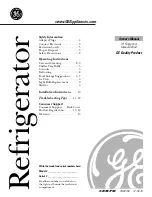
35
OPERATION
EN
G
LI
SH
Preparing for Vacation
Set the icemaker power button to OFF and shut off
the water supply to the refrigerator.
NOTE
• The ice bin should be emptied any time the
icemaker power button is turned to the OFF
position.
If the ambient temperature will drop below
freezing, have a qualified technician drain the
water supply system to prevent serious property
damage due to flooding caused by ruptured water
lines or connections.
Storing Food
Food Storage Tips
Wrap or store food in the refrigerator in airtight
and moisture-proof material unless otherwise
noted. This prevents food odor and taste transfer
throughout the refrigerator. For dated products,
check date code to ensure freshness.
CAUTION
• Do not overfill or pack items too tightly into door
bins. Doing so may cause damage to the bin or
personal injury if items are removed with
excessive force.
• Do not store glass containers in the freezer.
Contents may expand when frozen, break the
container and cause injury.
How to Store Food
• Butter or Margarine
- Keep opened butter in covered dish or closed
compartment. When storing an extra supply,
wrap in freezer packaging and freeze.
• Cheese
- Store in original wrapping until used. Once
opened, rewrap tightly in plastic wrap or
aluminum foil.
• Milk
- Wipe milk cartons. For coldest milk, place
containers on an interior shelf.
• Eggs
- Store in original carton on interior shelf, not on
door shelf.
• Fruit
- Do not wash or hull fruit until it is ready to be
used. Sort and keep fruit in original container
in a crisper, or store in completely closed
paper bag on refrigerator shelf.
• Leafy Vegetables
- Remove store wrapping, trim or tear off
bruised and discolored areas, wash in cold
water, and drain. Place in plastic bag or plastic
container and store in crisper.
• Vegetables with skins (carrots, peppers)
- Place in plastic bags or plastic container and
store in crisper.
• Fish
- Freeze fresh fish and shellfish if they are not
being eaten the same day purchased. Eating
fresh fish and shellfish the same day
purchased is recommended.
• Leftovers
- Cover leftovers with plastic wrap or aluminum
foil, or store in plastic containers with tight
lids.
Storing Frozen Food
Check a freezer guide or a reliable cookbook for
further information about preparing food for
freezing or food storage times.
Freezing
Your freezer will not quick-freeze a large quantity
of food. Do not put more unfrozen food into the
freezer than will freeze within 24 hours (no more
than 2 to 3 pounds of food per cubic foot of freezer
space). Leave enough space in the freezer for air to
circulate around packages. Be careful to leave
enough room at the front so the door can close
tightly.
Storage times will vary according to the quality
and type of food, the type of packaging or wrap
used (how airtight and moisture-proof) and the
storage temperature. Ice crystals inside a sealed
package are normal. This simply means that
moisture in the food and air inside the package
have condensed, creating ice crystals.
NOTE
• Allow hot foods to cool at room temperature for
30 minutes, and then package and freeze.
Cooling hot foods before freezing saves energy.
us_main.book.book Page 35 Thursday, January 7, 2021 5:38 PM
















































